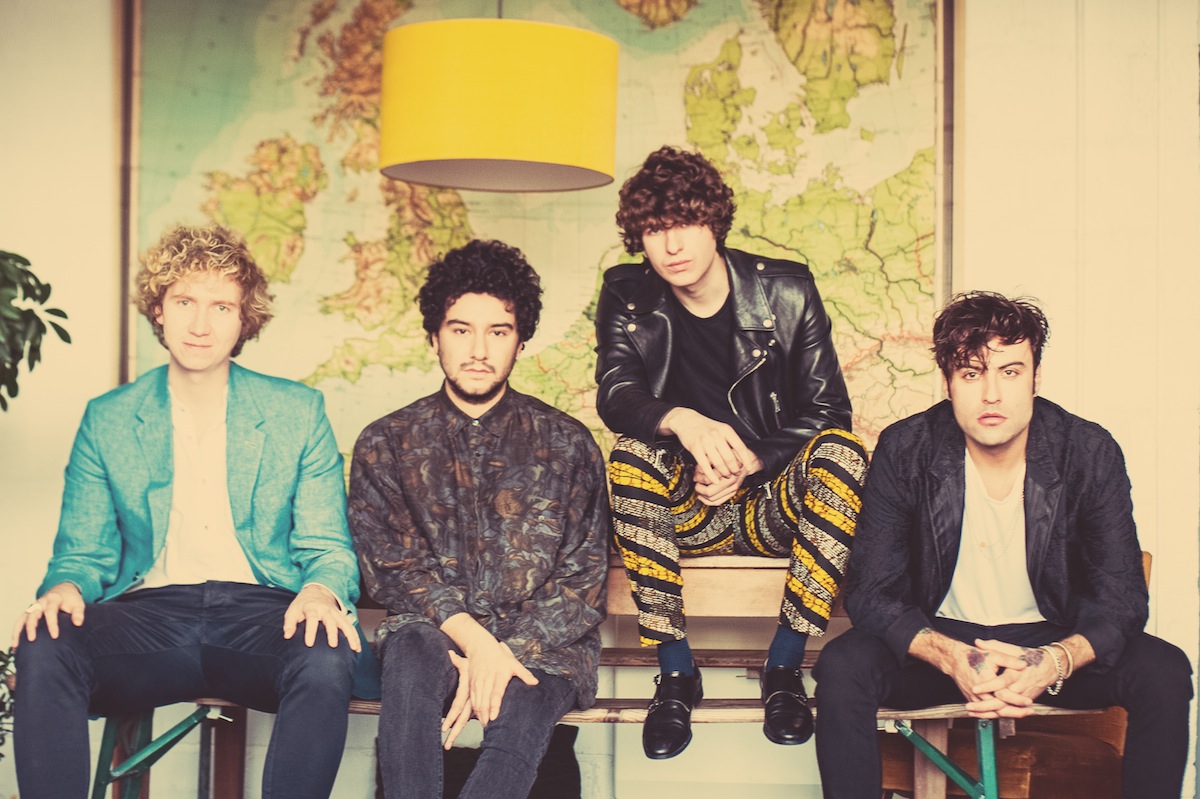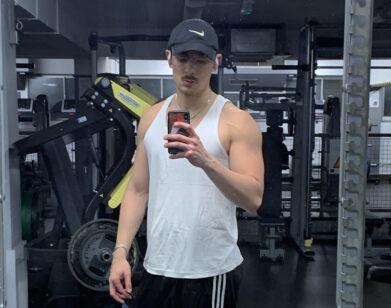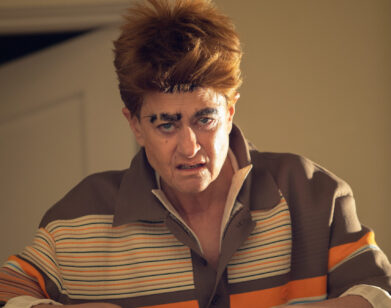The Gospel of Kook

ABOVE: THE KOOKS
New Orleans, Louisiana: not the location where you’d expect to see The Kooks tearing up a rulebook. Here in 2014—just a month shy of the eighth anniversary of Inside In / Inside Out, the breakout album that introduced them as scuzzy messengers of Britain’s solution to the post-’90s guitar-pop puzzle initiated by The Strokes—the Brighton quartet have veered off the road frequently traveled to reevaluate their notes. In 2011, the band embarked on a three-year hiatus, traveling home, to family, and afar to the American South. They made use of the time by eschewing traditions and declaring ideological bankruptcy, traveling forth with the plain currency of childlike wonder towards music. On their new album, Listen, The Kooks’ fourth studio effort, it really shows.
Tossing aside a homegrown, indie-festival identity forged across college dorms, suburban grids, and festival stages over the last decade, Listen spills over with world influences as wide and varied as they come. Namely, there’s a strong R&B undercurrent (just give “Down” a listen), a result of an immersion period in Nashville and New Orleans, as well as the touch of incoming producer Inflo, a relatively unknown 25-year-old hailing from North London. The album leans heavily on soul and loose, free-style concepts, with gospel choirs, Latin- and Ethiopian-influenced percussion, improvisational jazz, and ebullient flashes of yelp and response all seizing the wheel for gleeful, extended spins. This may be the most substantially diverse record The Kooks have ever made. Alternately, it’s their most intentionally polished musical effort to date, albeit one that still retains a familiar splash of youthful humor and classically haphazard energy. The fuzzy, static grip of their early records is long gone, but you can hear traces and relics if you listen for them—and you won’t have to listen too hard. The Kooks may be finally admitting their own naïveté, but they sound wiser than ever, even though much of what you hear on Listen is the product of a good deal of earnest, hopeful experimentation.
Interview caught up with singer and co-producer Luke Pritchard to see the reasoning behind this changed, new band and how it came about.
JOY SHI: Where are you calling from today?
LUKE PRITCHARD: I’m in London at my flat right now. It’s so nice to be home for a day or two.
SHI: All of your bandmates seem to have gone on personal odysseys prior to regrouping for this album, or at least it seems like it. Can you speak to that?
PRITCHARD: Yeah, we did. There was a period there when we went to kind of live life as human beings rather than being a traveling circus. So everyone went to go and get some stuff out, for sure. Two of the guys in the band have children, so they got to have some family time. And I went away to the States and did some writing. When we came back together, there was a freshness from that. So I don’t know about odysseys, but I think there was just sort of a need for us to reevaluate shit, you know what I mean? I think it’s a point in your life, regardless of whether or not you’re in a band, and that’s where we were.
SHI: It’s very human to reevaluate your identity and where you’re going. So you got out and took a lot of time traveling in the South in Nashville and New Orleans?
PRITCHARD: I was like “What’s a redneck? I need to become a redneck for a bit to understand the enemy.” It was great. [laughs] It was good to experience going to the roots of the all the music I love. I did stuff like I would see music in the church; that was great.
SHI: What churches did you visit in the South?
PRITCHARD: I did go into one in New Orleans, but I didn’t see a congregation. But I went to church in Washington and in New York, in Harlem, and I’ve seen gospel choirs in London as well, which were not too far off. I like the inclusiveness of it. There’s a small festival in Washington D.C. with a gospel choir outside with this guy who was like, James Brown in his prime, on the piano and singing. We were the only white people there and it was really inclusive, there was a sense of community, and even in England when we go to quite stuffy churches. I wasn’t brought up religious at all, my mum is an atheist and randomly I went to a Catholic school; I’ve had some weird theological upbringing, basically. But I do think if you’re religious or not, the world and society now lacks as much of that community spirit as it had. When you go to church and everyone sings together, even singing hymns—which I love singing them, fucking amazing, great melodies—you’re singing together. It doesn’t matter what you believe in, there’s something about that. I think in music there is just something inherently spiritual in singing together and harmonizing, and gospel is the truest form of that.
SHI: Is that what draws you to churches? The spiritual-musical communion of it? I feel like for the general, non-church attending masses, there isn’t really any public ritual connecting us, minus the pledge of allegiance.
PRITCHARD: Maybe that’s why we have so many popular music concerts, why everyone goes and watches gigs together and sings together. In that moment maybe is what we’re lacking: what we used to have once a week.
SHI: We have the Cupid Shuffle now that we can do together, but back in the ’50s and ’60s, everyone knew how to do so many dances in high school and college, you’d just go out to a bar and everyone knew how. It’s so different now.
PRITCHARD: True. I think there was something that inspired me to do that in this record. Thinking about what we do as a band; even with us, we’re not the biggest band in the world or anything, but when we tour we look out and everyone sings together and there’s a weird, amazing sense of communion. When you do festivals and everyone claps along, there are these deep moments. I wanted to try and bring in some of what the church offers to that, which is a kind of weird circle, because that’s where all the music, creative stuff comes from originally—the church. Call and response, blues, jazz, soul, particularly soul really. Soul songs, Sam Smith songs, they’re all church. And James Brown was all about the church songs—they just put lyrics about sex, and fucking, you know what I mean? I’m rambling.
SHI: Not at all. Did you travel with the intention of researching to create a soul record?
PRITCHARD: To be honest, it wasn’t just about music. A lot of the time when I was out there, I was writing bits and pieces, but none of it made the album. It was more just for experiencing. And I think that really seeped into the music afterwards. Going to America, I mean I love and hate America just as much as everyone else; it’s such an amazing fucking place. I was going and trying to experience some of the stuff people went through when they created the music that I love; trying to trace the roots of all popular music, which I think really starts in the church, and gospel. I don’t know in my head, I was researching a bit and enjoying music and going dancing every night and meeting people. I traveled on my own, which was weird, fucking weird. I love it.
SHI: Speaking of roots, did you spend any time on Frenchman Street in New Orleans?
PRITCHARD: Yes, it’s amazing, it’s really authentic. New Orleans has that side of it that’s very touristy, isn’t it? Frenchman street is very authentic, it felt untouched, and the music, what was that place—I want to say the Catskills Club—the music in there was unbelievable, I mean it was like going back in time, incredible.
SHI: It sounds like you picked up on that improvisational type of feeling out there and brought it back with you for this album.
PRITCHARD: I didn’t think, it just seeped in. At the time; I just was having fun and then I got back to London and I did this song “Around Town” where I had this idea to write a song with a gospel choir sound pool and a little hip-hop beat, but more really just with an old-time feel to it—and it sparked the whole album. It felt natural, it didn’t feel forced, and it was amazing, such a great feeling. And I played it to the guys and it was like shit, let’s go further into that.
SHI: There’s a Latin, Sergio Mendes style to it as well, in addition to the Ethiopian percussion experimentation, and jazz instrumental influences. Did anyone have to pick up new instruments to make the album happen?
PRITCHARD: The only instruments that we picked up that we hadn’t before was percussion, and it’s quite loose because of that, because we’re not percussion players. But Alexis, our drummer, is pretty damned good. It’s kind of interesting because the Ethiopian stuff and the Latin and the gospel: it’s not like we’re well-versed in it. We’re kind of like kids with music: we’re still discovering stuff. All of sudden we were like, yeah, let’s bring all these things we’ve been sort of aware of into what we do, and make it a world music fusion album. This album is the outcome of that. I can’t be in any way pretentious about it, because it was just us trying some new stuff and thinking, “This is sounding really good.” We didn’t go too far or we didn’t lose the kind of the heart of the band—we just kind of brought some different vibes in.
SHI: This is probably going to put a lot of eyeballs on Inflo, as your band is much more established than he is and this is his first major producing credit. It’s an unlikely pairing, but you’ve developed a friendship.
PRITCHARD: I think he deserved it, not only from rock bands but from hip-hop, any people. He’s actually like a Quincy Jones, he really is, and he’s only 25 and most producers are in their 40s. It’s crazy. For all of us, he’s a friend, a guru, a producer. He’s a really important part of our lives now. It really changed my way of looking at music in general, not only because we were from two completely different sides of the musical spectrum and it worked, but more just him as a person. I’d not really had a songwriting partner ever. And he co-wrote most of the songs. That is weird for me because of the way I always viewed bands, I thought bands always write their own songs, that’s just the way it is. But it wasn’t, he wasn’t like one of those go-to songwriter guys, your Dr. Luke or whatever the fuck, it was just something that really clicked.
SHI: Now with all these changes, how will incorporating this new sound affect your tour this time around? What are you hoping will be different?
PRITHCARD: I have my own goals in my head in terms of things that would be great to happen with it. But I think already I feel so confident about where to go from the musical side, and the one thing to keep true to is the album. The outside world, and all that, especially having done four albums, that can all be a red herring. I mean it’s great, the pressure’s on, but it doesn’t mean anything in finite terms. To be honest we’ve really reinvented our band, and to see that through with the touring will be fun. We are changing the way we play live, the grooves are getting deeper, the intimate and jam bits between songs are becoming more natural to us. We’re losing the idea of “just turn up and play a few songs.” Our shows are becoming more theatrical in their production, and there are so many new things we’re getting into. For me I just see it as sort of a longer-term thing, not just for one album.
SHI: Do you care at all if this album confuses or fractures your audience in any way?
PRITCHARD: I don’t often think about the fact that we have an audience, to be honest. I think I should, probably more, hence my stupid tweets and things. I just feel, a lot of the time when I walk around in life, just quite distanced from all that. I’d like it to be something that does divide, as I think great art divides. But I don’t know if we’ve made great art yet, but that’s the journey I’m trying to get on. I do think that really great music will divide people, and people will love and hate it at the same time.
LISTEN IS OUT TODAY, SEPTEMBER 9. FOR MORE ON THE BAND, VISIT ITS WEBSITE.






